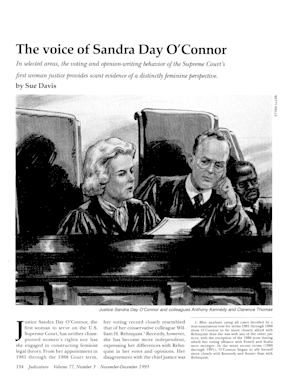The Voice of Sandra Day O'Connor
January 1993

DISCLAIMER: This text has been transcribed automatically and may contain substantial inaccuracies due to the limitations of automatic transcription technology. This transcript is intended only to make the content of this document more easily discoverable and searchable. If you would like to quote the exact text of this document in any piece of work or research, please view the original using the link above and gather your quote directly from the source. The Sandra Day O'Connor Institute does not warrant, represent, or guarantee in any way that the text below is accurate.
Article Text
(Excerpt, Automatically generated)
The voice of Sandra Day O'Connor
In sekcted areas, the voting and opinion-writing behavior of the Supreme Court's first woman justice provides scant evidence of a distinctly feminine perspective.
by Sue Davis
Justice Sandra Day O'Connor and colleagues Anthony Kennedy and Clarence Thomas
Justice Sandra Day O'Connor, the first woman to serve on the U.S. Supreme Court, has neither cham pioned women's rights nor has she engaged in constructing feminist legal theory. From her appointment in 1981 through the 1988 Court term, her voting record closely resembled that of her conservative colleague Wil liam H. Rehnquist. 1 Recently, however, she has become more independent, expressing her differences with Rehn quist in her votes and opinions. Her disagreement with the chief justice was most apparent in the opinions she wrote in two recent decisions involving reproductive rights.2
Bloc analyses using all cases decided by a non-unanimous vote for terms 1981 through 1988 show O'Connor to be more closely allied with Rehnquist than she was with any of the other jus tices, with the exception of the 1986 term during which her voting alliance with Powell and Scalia were stronger. In the more recent terms (1989 through 1991), O'Connor began to ally herself more closely with Kennedy and Souter than with Rehnquist.
134 Judicature Volume 77, Number 3 November-December 1993
Her growing independence, plus the growing body of scholarship known as "different voice" feminism,
